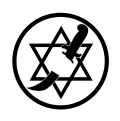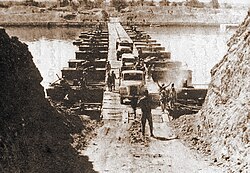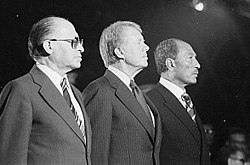Arab–Israeli conflict
The Arab–Israeli conflict [N 1] is a term used to describe the political tensions and open hostilities between the Arab countries of the Middle East and North Africa and the State of Israel. The conflict has gone on since 1948.
The Arab–Israeli conflict began from earlier tensions between the Arab and Jewish communities in British Mandatory Palestine, with the rise of two nationalist movements - Zionist movement among Jews and Arab nationalism among the Arabs. The ethnic conflict in Mandatory Palestine was also a result of the collapse of the Ottoman Empire, which created tension over the division and ownership of the land. While the Jewish people saw the land as their historical homeland of the Land of Israel, the Palestinian people and Pan-Arab movement saw the land as Palestine belonging to the Arabs and in the Pan-Islamic context, as territory regarded as Muslim lands.
The modern conflict started with the 1948 Arab-Israeli war in parallel with the creation of state of Israel by the Jews. Later, on the course of the 1948 War, the All-Palestine Government was created in Gaza Strip by the Arab League, as an Arab Palestinian state. Israel won the 1948 war, and the All-Palestine Government moved to Cairo in Egypt and were not allowed to return to Gaza. They gradually lost importance, until abolished in 1959 by the Egyptian President Nasser.
In 1964, another Palestinian political organization was formed by Yasser Arafat (named Palestinian Liberation Organization), and became the most important Palestinian movement. In 1967, Arab countries and Israel fought the Six-Day War, resulting in Israeli takeover of Gaza Strip and Sinai Peninsula from Egypt, West Bank from Jordan and Golan Heights from Syria. Jordan, Egypt and PLO soon began a low-level War of Attrition, which lasted from 1967 to 1970 with no significant benefits to any side. In 1973, another major war, the Yom Kippur War, was started by Egypt and Syria to regain the territory lost in the Six Day War. Egypt liberated part of the Sinai, and Syria was pushed back to Damascus. Egypt and Israel both claimed victory and till now historians argue as to whom the victory belongs to.
Over the years, it has changed from the large-scale Arab–Israeli conflict to a more local Israeli-Palestinian conflict, though the Arab World and Israel still disagree with each other over specific territory.
Arab–Israeli Conflict Media
Yitzhak Rabin, Bill Clinton, and Yasser Arafat at the Oslo Accords signing ceremony on 13 September 1993





